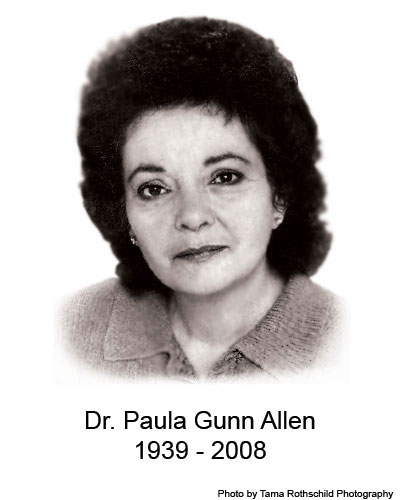|
|
||
Paula Gunn Allen
by MariJo Moore I wrote the above poem Women of Words in 1997 for various American Indian women writers, including Paula Gunn Allen, who passed to spirit in May of 2008. Known as the founder of American Indian literary studies, Gunn Allen was a formidable woman in the world of literature and will be missed in many arenas. She was the gracious recipient of various awards including the Hubbell Medal for Lifetime Achievement (2000) and Native Writer's Circle Lifetime Achievement Award (2001). Gunn Allen authored many books in various genres, including Pocahontas: Medicine Woman, Spy, Entrepreneur; The Sacred Hoop: Recovering the Feminine in American Indian Traditions; and Grandmother of the Light: A Medicine Woman's Source Book. From these I gleaned the following confirmations: Menstrual taboos are about power, not sin or filth, in some American Indian tribes; "that women who are at the peak of their fecundity are believed to possess power" that totally throws male power out of kilter. Therefore any "male-owned or -dominated ritual or sacred object" cannot perform its usual task and that is why women are kept from them during their cycles. Europeans, when first observing the Cherokees, believed them to have a "petticoat government" due to the importance of women's opinions and status in tribal decisions, and thus set out to change this. "Stories connect us to the universe of medicine-of paranormal or sacred power." And to my delight and substantiation, certain women of medicine can make "brooms dance." Gunn Allen was always generous when asked to contribute to anthologies I was editing, such as Genocide of the Mind ("God, what a title!" she wrote in her email), Eating Fire, Tasting Blood, and the latest, Birthed From Scorched Hearts: Women Respond to War, which Fulcrum Publishing will release in December, 2008. She contributed a new poem Apache Warrior-Apache Troop, introduced with the following: "Watching TV coverage of the invasion of Iraq, March 2003, and I am thinking how strange they use our (Native) names for their wars yet don't notice that more American Indians than any other group, demographically speaking, serve and have served in the armed forces." She was always drawing attention to things like this; making others look beyond names, phrases and of course, words. She loved my little book of poetry Confessions of a Madwoman. Of mixed ancestry (Laguna-Sioux-Lebanese- Scottish), Gunn Allen understood and underwent similar attacks from jealous Indians that I have had to endure while writing and promoting American Indian literature. An inspiration for many years, I will miss her wonderful sense of humor and her delightful encouragement. But, great woman of words that she was, her writings will no doubt endure forever.
|
||
|
|
||
